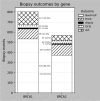Breast biopsies and breast cancer risk in Israeli BRCA germline pathogenic variant carriers
- PMID: 40694193
- PMCID: PMC12397147
- DOI: 10.1007/s10549-025-07787-3
Breast biopsies and breast cancer risk in Israeli BRCA germline pathogenic variant carriers
Abstract
Purpose: Benign breast disease (BBD), particularly with proliferative changes, is a risk factor for breast cancer (BC) development in average risk women. There is a paucity of data on high-risk, BRCA1 and BRCA2 pathogenic variants (PVs) carriers.
Methods: Female BRCA1 and BRCA2 PV carriers treated at the Meirav Clinic, Sheba Medical Center between May 2011 and December 2024 were eligible. Data on in-hospital breast biopsies were retrieved following an ethically approved protocol. Statistical analyses included χ2 test (categorical variables) Mann-Whitney U test (continuous variables) and logistic regression for multivariate analysis.
Results: Overall, 1466 women (849 BRCA1 PV carriers) were monitored over 10,113 women/years. A total of 1453 biopsies were carried out in 454 participants (range 1-8 biopsies), with the majority (76.3%) benign and 242 (16.6%) malignant. Rates of BC in women undergoing at least two benign biopsies were correlated with the number of biopsies, being an older BRCA1 PV carrier, whereas having been diagnosed with fibroadenoma-seems not to increase BC risk.
Conclusions: In Israeli BRCA PV carriers, the number of biopsies, BRCA1 PV carriership were associated with an increased risk for developing BC, whereas fibroadenoma does not increase that risk. It is imperative to validate these preliminary observations.
Keywords: Atypia; BRCA PV carriers; Breast biopsy; Breast cancer; Histological instability; Proliferative and non-proliferative benign breast disease.
© 2025. The Author(s).
Conflict of interest statement
Declarations. Conflict of interest: The authors have no conflicts of interest to declare that are relevant to the content of this article.
Figures



Similar articles
-
Long-term health outcomes of bilateral salpingo-oophorectomy in BRCA1 and BRCA2 pathogenic variant carriers with personal history of breast cancer: a retrospective cohort study using linked electronic health records.Lancet Oncol. 2025 Jun;26(6):771-780. doi: 10.1016/S1470-2045(25)00156-1. Epub 2025 May 8. Lancet Oncol. 2025. PMID: 40347974
-
BRCA functional domains associated with high risk of multiple primary tumors and domain-related sensitivity to olaparib: the Prometheus Study.ESMO Open. 2025 Feb;10(2):104076. doi: 10.1016/j.esmoop.2024.104076. Epub 2025 Jan 22. ESMO Open. 2025. PMID: 39847877 Free PMC article.
-
Hormonal Contraception and Breast Cancer Risk for Carriers of Germline Mutations in BRCA1 and BRCA2.J Clin Oncol. 2025 Feb;43(4):422-431. doi: 10.1200/JCO.24.00176. Epub 2024 Oct 2. J Clin Oncol. 2025. PMID: 39356978 Free PMC article.
-
Risk-reducing bilateral salpingo-oophorectomy in women with BRCA1 or BRCA2 mutations.Cochrane Database Syst Rev. 2018 Aug 24;8(8):CD012464. doi: 10.1002/14651858.CD012464.pub2. Cochrane Database Syst Rev. 2018. PMID: 30141832 Free PMC article.
-
Modifiers of cancer risk in BRCA1 and BRCA2 mutation carriers: systematic review and meta-analysis.J Natl Cancer Inst. 2014 Jun;106(6):dju091. doi: 10.1093/jnci/dju091. J Natl Cancer Inst. 2014. PMID: 24824314 Free PMC article.
References
-
- Kim J, Harper A, McCormack V, Sung H, Houssami N, Morgan E et al (2025) Global patterns and trends in breast cancer incidence and mortality across 185 countries. Nat Med 31:1154–1162. 10.1038/s41591-025-03502-3 - PubMed
-
- Kuchenbaecker KB, Hopper JL, Barnes DR, Phillips KA, Mooij TM, Roos-Blom MJ et al (2017) Risks of breast, ovarian, and contralateral breast cancer for BRCA1 and BRCA2 mutation carriers. JAMA 317(23):2402–2416. 10.1001/jama.2017.7112 - PubMed
-
- Hartmann LC, Sellers TA, Frost MH, Lingle WL, Degnim AC, Ghosh K et al (2005) Benign breast disease and the risk of breast cancer. N Engl J Med 353(3):229–237. 10.1056/NEJMoa044383 - PubMed
-
- Ashbeck EL, Rosenberg RD, Stauber PM, Key CR (2007) Benign breast biopsy diagnosis and subsequent risk of breast cancer. Cancer Epidemiol Biomark Prev 16(3):467–472. 10.1158/1055-9965.EPI-06-0394 - PubMed
-
- Dyrstad SW, Yan Y, Fowler AM, Colditz GA (2015) Breast cancer risk associated with benign breast disease: a systematic review and meta-analysis. Breast Cancer Res Treat 149(3):569–575. 10.1007/s10549-014-3254-6 - PubMed
MeSH terms
Substances
LinkOut - more resources
Full Text Sources
Medical
Research Materials
Miscellaneous

